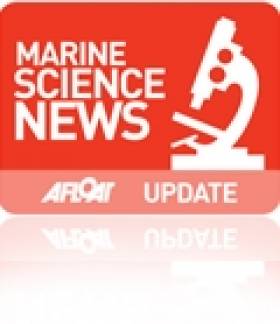Displaying items by tag: Sea for Society
#SeaforSociety - An open day saw more than 150 children from five schools from Dublin, Cork, Galway, and Mayo visit the Marine Institute's research vessel, the RV Celtic Explorer, as well as Galway Atlantaquaria, as part of the EU FP7 Sea for Society project to raise awareness of our ocean, this week in Galway city.
The Sea for Society collective action aims to shape the concept of a "Blue Society" and improve Europe's understanding on the relation between the ocean and our daily life activities. "As part of the Sea for Society FP7 project in Ireland, we provided the opportunity for children to see and take part in a wide range of activities including meeting with marine scientists, researchers and the Captain of the RV Celtic Explorer, as well as the team from AquaTT and marine experts at the aquarium," explained Cushla Dromgool-Regan, Marine Institute.
On the vessel the children meet with the fisheries research team who showed a wide range of fish from the deep ocean. The seabed mapping researchers showed bathymetry mapping images of key shipwrecks around Ireland as well as the newly discovered submarine mountain ranges mapped by the RV Celtic Explorer on its latest expedition from Newfoundland to Galway.
The remotely operated vehicle ROV Holland I, which is to be used in the vessels next expedition filming cold water corals on the Porcupine bank, was also on display. This
provided a key opportunity for the children to learn about marine history, marine technology well as taking part in some simple experiments demonstrating pressure.
AquaTT also asked the teachers and children to think about the small changes we can make in our lifestyle which have a significant impact on the ocean, such as using less water, eating fish that has been caught sustainably, disposing plastics in a responsible way, to taking part in beach cleans.
Galway Atlantaquaria provided tactile learning opportunities where the students got to touch and see marine animals native to Irish seashores and ocean.
Teachers and pupils alike described the event as a unique and wonderful experience. "I've attended many trips with the school, but this one really stood out. We learned so much, ranging from how phytoplankton in our ocean provide up to 50 percent of the oxygen we breathe, to how to tell the age of a fish using their ear bones - otoliths. Raising awareness of our ocean and the impact that the ocean has on us is so important," said Maire Ni Fhoghlu, from Gaelscoil Uileog de Burca, Claremorris.
The children who attended the open day had taken part in the Marine Institute's Explorers Education Programme which is run by Galway Atlantaquaria, Blackrock Education Centre, SeaLife – Bray and Lifetime Lab in Cork, and is also supported by other education centres in Mayo and Galway.
"The excellent marine activities and projects completed this year by the schools were evident by the enthusiasm and knowledge of the children who visited the Celtic Explorer. For an island nation it is heartening to see that the children are learning about our ocean, understanding the importance of scientific marine research as well as taking personal responsibility for caring for our marine environment," Cushla Dromgool-Regan further said.
The Explorers Education programme also provides a range of cross curricular teaching resources and lesson plans for all primary schools to freely download at www.explorers.ie
In addition for more details on the programme details click HERE.






























































